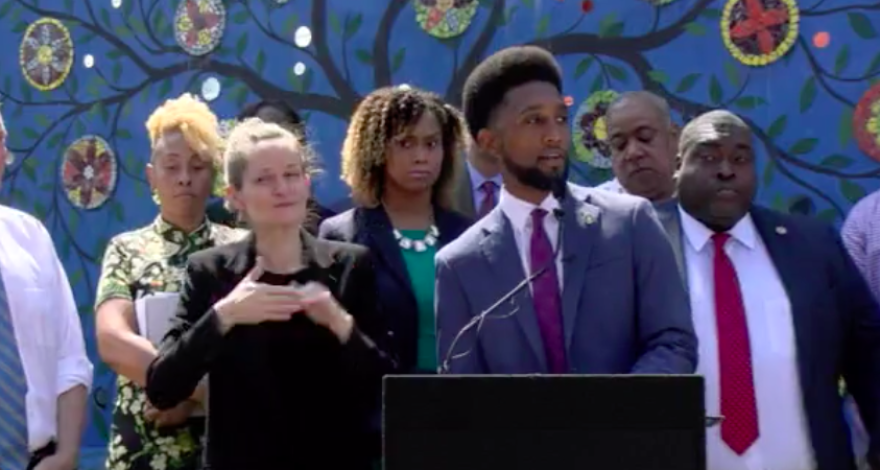Mayor Brandon Scott pledged to lower gun violence in Baltimore by 15% every year for the next five years in a crime plan released Friday morning. He says the city can get there by expanding violence intervention programs such as Safe Streets, bolstering gun trafficking investigations and improving collaboration among city agencies.
“City government has shied away from setting ambitious goals to reduce violent crime,” Scott said at the first of a series of news conferences across the city that touted the violence prevention plan. “I believe setting strong goals and pushing my entire administration to work with complete focus, dedication and accountability to achieve them is the only way to operate.”
The Democrat released the plan after dozens of community input sessions across the city and amid a spike in annual homicides. As of Friday, Baltimore has experienced 10 more killings than this time last year, for a total of 192.
A primary focus of the plan is a group violence reduction strategy to target those most likely to be involved in gun violence. The Mayor’s Office of Neighborhood Safety and Engagement, or MONSE, which oversees citywide gun violence prevention plans, will work to add 20 violence prevention contracts across Baltimore. Such programs, including 10 Safe Streets sites and seven hospital-based partnerships, work to de-escalate interpersonal conflict at risk of devolving into deadly behavior. The plan also calls for an expansion of victim services to gunshot survivors.
Group Violence Reduction Strategy, an inter-agency collaboration among Scott, the Baltimore Police Department, the State’s Attorney’s Office and federal partners that will work to reduce homicides.
The plan addressed distrust between residents and police. MONSE will create and oversee the Public Safety Advisory Commission - a group of residents from each police district - to deliver recommendations to Scott and the City Council on how BPD may improve interactions with marginalized communities.
Data on the plan’s successes and failures will be publicly available, Scott said. MONSE will update the plan every other year based on that data, as well as community feedback.
“This work will be driven by a sense of urgency and a commitment to making improvements along the way while building systems, structures and relationships necessary for the successful implementation of this five year plan,” he said.
Scott also criticized previous policies — policing, prosecutions and prisons — that he said failed to produce long-term results and took a toll on vulnerable communities.
The plan did not include a price tag. Scott campaigned as a progressive who would prioritize the process of gradually moving funding away from the police department; his first budget increased the agency’s annual budget. He cited increased retirement costs and said he would create a task force to study how to lower BPD’s annual budget in accordance with the ongoing federal consent decree.
He submitted nominations to the City Council for the Local Control Advisory Board earlier this week.



